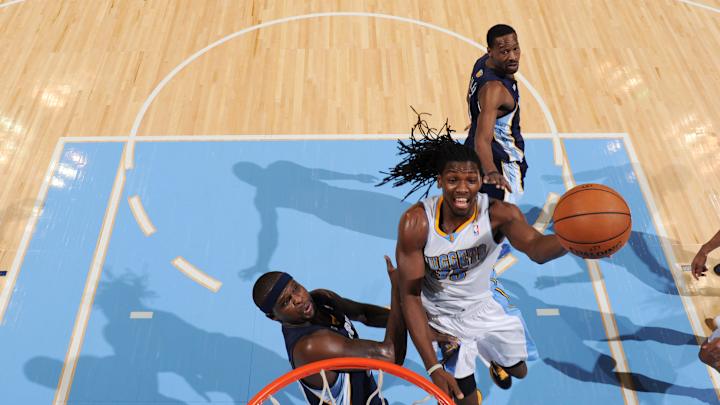Three pointers: Nuggets earn a tough win by out-scrapping the Grizzlies

Kenneth Faried gave Denver a boost with his defense and hustle. (Photo by Garrett W. Ellwood/NBAE via Getty Images)
By Rob Mahoney
Momentum was a luxury that neither the Memphis Grizzlies nor the Denver Nuggets could afford on Friday night, as pressure defense and sloppy play brought both Western Conference competitors to a stalemate. From that point, all it took was a few haphazardly successful plays to give Denver a 99-94 win that was somehow even closer than the already slim margin suggests.
• With neither team at its best offensively, the central conflict of this game came courtesy of the Grizzlies' offensive rebounding and the Nuggets' defensive scrapping. It's not at all surprising that Memphis -- a team that ranks third in the league in offensive rebounding rate -- would wipe the offensive glass clean; domination in that particular dimension of the game is implicit to the Grizzlies' grit-and-grind identity, and a team-wide effort produced an extra possession on over 36 percent of Memphis' own missed shots. Marc Gasol and Zach Randolph are typically the powerhouses behind the team's strong rebounding rate, but Rudy Gay and Mike Conley each grabbed three offensive boards as the Grizz willed their way to frequent second-chance opportunities. By game's end, Memphis had attempt 25 more shots than the Nuggets -- and yet they still failed to capitalize on their glut of hard-earned possessions with a win.
For their part, the Nuggets used the length and speed throughout their roster to great advantage on the defensive end, where they handcuffed the Grizzlies' top scorers by clogging up passing lanes and funneling every ball action towards the middle. There, Denver created a defensive gauntlet of long, swatting arms and well-positioned bigs, all of which forced Memphis into uncomfortable floaters and long two-pointers at an uncommon clip. Kenneth Faried, JaVale McGee, and Kosta Koufos did a marvelous job of marginalizing the Grizzlies' normally potent post play, and without that offensive anchor, or much space to navigate the paint, Memphis' top-10 offense was left drifting aimlessly on the perimeter.
• On paper, one would think that the size and skill of Randolph and Gasol would cause unspeakable problems for the unreliable Nuggets big men; the Grizzlies typically run their sets off of the direct posting of one of their bigs (or at least the threat of such action) and McGee, Faried, and Koufos are fairly easy marks for low-block exploitation. Yet that could not have been further from the case in this particular game, as some early offensive struggles (and some rather unlikely defensive success by those aforementioned Nuggets bigs) prompted Grizzlies head coach Lionel Hollins to downsize his lineups to the point that Randolph and Gasol played about five combined minutes fewer than usual. That's not a huge departure from the strategic norm, but it was significant enough to result in some late-game stagnation when Memphis might otherwise look to Randolph to create in a one-on-one situation.
Rudy Gay was ultimately able to put up some plausible attempts in the last few minutes, but those looks were almost always the result of passive dribbling around the perimeter and team-wide deference as the precious time on the shot clock trickled away. There was no specific advantage in his methods, just the cold probability of a solid jumpshooter taking a difficult attempt over the outstretched arms of a defender. It could have been worse (as evidenced by Gay's costly late-game turnover), but it's worth considering if the Grizzlies' willingness to go without Randolph for certain stretches may have unsettled the default workings of their fourth-quarter offense.
• By this point, NBA fans are all quite familiar with the incredible divide in McGee's on-court play. On some days, he's an unconscionably negative force -- plagued not only by counterproductive habits, but also a complete lack of self-awareness concerning the damage he does to his own team. On other nights, he's a marvelous difference-maker on both ends, equipped with the height and athleticism to turn any play into a tide-turning highlight. McGee is a player tethered to ends of his individual playing spectrum, restricted to that simple binary without the slightest clue of how to play in a way that isn't fundamentally extreme.
Luckily for Denver, the far more preferable version of McGee showed up on Friday night and made an impact on the game that far exceeded his individual stat line (nine points, six rebounds, four blocks). He lurked around the baseline on offense, waiting to catch drop-off passes and swoop toward the basket with a single stride. He worked hard defensively, insomuch as his remarkably poor conditioning would allow (woe be the asthmatics who wind up playing in Denver). He was an active and consistent presence on the glass, positioned himself perfectly to help against any Memphis player who made his way into the paint, and protected the rim at every opportunity. As much as we like to pretend that all well-executed plays count the same regardless of their highlight merits, the truth is that standout sequences like this one matter a great deal in terms of setting a defensive precedent:
GIF H/T: @cjzero.

Rob Mahoney is an NBA writer dedicated to the minutiae of the game of basketball, its overarching themes and everything in between. He joined the Sports Illustrated staff in 2012.